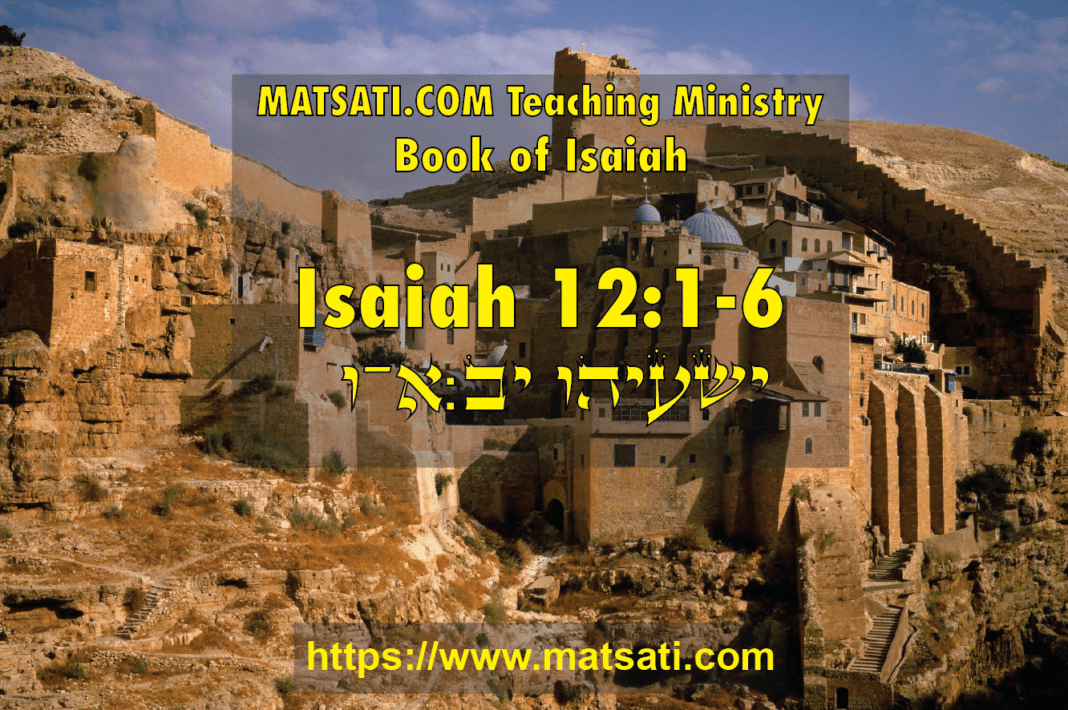Table of Contents
Introduction to Isaiah 12:1-6
Isaiah 12 appears to be a praise chapter. John Oswalt says that this chapter concludes the previous 11 chapters. Something to note, Isaiah 1-11 the common theme was to trust in God, to pay attention to the words of the prophet, the Lord God Almighty is the Creator, all powerful, and there is nothing to fear, the Lord can be trusted to keep them. The people however refused to trust in the Lord due to their sins. The love of God to keep His people led to their not being utterly destroyed, but a remnant remained. Isaiah opens chapter saying the following:

ספר ישעיה פרק יב
א וְאָמַרְתָּ בַּיּוֹם הַהוּא אוֹדְךָ יְהֹוָה כִּי אָנַפְתָּ בִּי יָשֹׁב אַפְּךָ וּתְנַחֲמֵנִי: ב הִנֵּה אֵל יְשׁוּעָתִי אֶבְטַח וְלֹא אֶפְחָד כִּי עָזִּי וְזִמְרָת יָהּ יְהֹוָה וַיְהִי-לִי לִישׁוּעָה:
Isaiah 12:1 states, “And in that day thou shalt say, O LORD, I will praise thee: (וְאָמַרְתָּ בַּיּוֹם הַהוּא אוֹדְךָ יְהֹוָה) though thou wast angry with me, thine anger is turned away, and thou comfortedst me. (כִּי אָנַפְתָּ בִּי יָשֹׁב אַפְּךָ וּתְנַחֲמֵנִי)” Isaiah 12:2 “Behold, God is my salvation; (הִנֵּה אֵל יְשׁוּעָתִי) I will trust, and not be afraid: (אֶבְטַח וְלֹא אֶפְחָד) for the LORD JEHOVAH is my strength and my song; he also is become my salvation. (כִּי עָזִּי וְזִמְרָת יָהּ יְהֹוָה וַיְהִי-לִי לִישׁוּעָה)” These verses remind us that no matter what is going on in our lives we should give Him praise and offer thanks for all His mercies. The Psalmist says according to Tehillim / Psalms 22:3.

ספר תהלים פרק כב
ד וְאַתָּ֥ה קָד֑וֹשׁ י֝וֹשֵׁ֗ב תְּהִלּ֥וֹת יִשְׂרָאֵֽל׃
Tehillim / Psalms 22:3
22:3 and you are holy and dwell in the praises of Israel.
The Lord indeed dwells in the praises of His people. This is what it means when Isaiah states, 12:2 “Behold, God is my salvation; (הִנֵּה אֵל יְשׁוּעָתִי) I will trust, and not be afraid: (אֶבְטַח וְלֹא אֶפְחָד) for the LORD JEHOVAH is my strength and my song; he also is become my salvation. (כִּי עָזִּי וְזִמְרָת יָהּ יְהֹוָה וַיְהִי-לִי לִישׁוּעָה)” we note that judgment is not the final outcome, if only the people would relent, they could go in the inheritance of God. Here in Isaiah, he says הִנֵּה אֵל יְשׁוּעָתִי “Behold God is my Yeshua” (my Jesus / my salvation). Here the Lord is telling us through Yeshua the Lord is our strength and our song and it is in Him we can trust. Note what we read according to the book of Nehemiah.

ספר נחמיה פרק ח
ט וַיֹּ֣אמֶר נְחֶמְיָ֣ה ה֣וּא הַתִּרְשָׁ֡תָא וְעֶזְרָ֣א הַכֹּהֵ֣ן׀ הַסֹּפֵ֡ר וְהַלְוִיִּם֩ הַמְּבִינִ֨ים אֶת־הָעָ֜ם לְכָל־הָעָ֗ם הַיּ֤וֹם קָדֹֽשׁ־הוּא֙ לַיהוָ֣ה אֱלֹהֵיכֶ֔ם אַל־תִּֽתְאַבְּל֖וּ וְאַל־תִּבְכּ֑וּ כִּ֤י בוֹכִים֙ כָּל־הָעָ֔ם כְּשָׁמְעָ֖ם אֶת־דִּבְרֵ֥י הַתּוֹרָֽה׃ י וַיֹּ֣אמֶר לָהֶ֡ם לְכוּ֩ אִכְל֨וּ מַשְׁמַנִּ֜ים וּשְׁת֣וּ מַֽמְתַקִּ֗ים וְשִׁלְח֤וּ מָנוֹת֙ לְאֵ֣ין נָכ֣וֹן ל֔וֹ כִּֽי־קָד֥וֹשׁ הַיּ֖וֹם לַאֲדֹנֵ֑ינוּ וְאַל־תֵּ֣עָצֵ֔בוּ כִּֽי־חֶדְוַ֥ת יְהוָ֖ה הִ֥יא מָֽעֻזְּכֶֽם׃
Nehemiah 8:9-10
8:9 Then Nehemiah the governor, Ezra the priest and teacher of the Law, and the Levites who were instructing the people said to them all, “This day is holy to the Lord your God. Do not mourn or weep.” For all the people had been weeping as they listened to the words of the Law. 8:10 Nehemiah said, “Go and enjoy choice food and sweet drinks, and send some to those who have nothing prepared. This day is holy to our Lord. Do not grieve, for the joy of the Lord is your strength.”
At this time the Lord was fulfilling His promise to restore Israel bringing her back to the Land. The people are hearing the words of the Torah for the first time and they are grieving due to their failure to listen and obey, they realize the great evil they had committed and the reason Israel, Judah, and Jerusalem were exiled to Babylon. So they wept. Nehemiah however says, כִּֽי־קָד֥וֹשׁ הַיּ֖וֹם לַאֲדֹנֵ֑ינוּ וְאַל־תֵּ֣עָצֵ֔בוּ כִּֽי־חֶדְוַ֥ת יְהוָ֖ה הִ֥יא מָֽעֻזְּכֶֽם׃ “This day is holy to our Lord. Do not grieve, for the joy of the Lord is your strength.” The point was that when we realize we have sinned, we need to repent and seek the forgiveness of God, and then rejoice because He is our strength! We give affirmation of God’s love, His grace, His mercy, His faithfulness, His compassion, and His salvation, in these things we confess how the enemy has been defeated. This is how David approaches his relationship with the Lord according to the psalms.

ספר תהלים פרק לד
יט קָר֣וֹב יְ֭הוָה לְנִשְׁבְּרֵי־לֵ֑ב וְֽאֶת־דַּכְּאֵי־ר֥וּחַ יוֹשִֽׁיעַ׃
Tehillim / Psalm 34:18
34:18 The Lord is close to the brokenhearted and saves those who are crushed in spirit. (NIV)
ספר תהלים פרק קלח
ז אִם־אֵלֵ֤ךְ׀ בְּקֶ֥רֶב צָרָ֗ה תְּחַ֫יֵּ֥נִי עַ֤ל אַ֣ף אֹ֖יְבַי תִּשְׁלַ֣ח יָדֶ֑ךָ וְת֖וֹשִׁיעֵ֣נִי יְמִינֶֽךָ׃
Tehillim / Psalms 138:7
138:7 Though I walk in the midst of trouble, you preserve my life. You stretch out your hand against the anger of my foes; with your right hand you save me. (NIV)
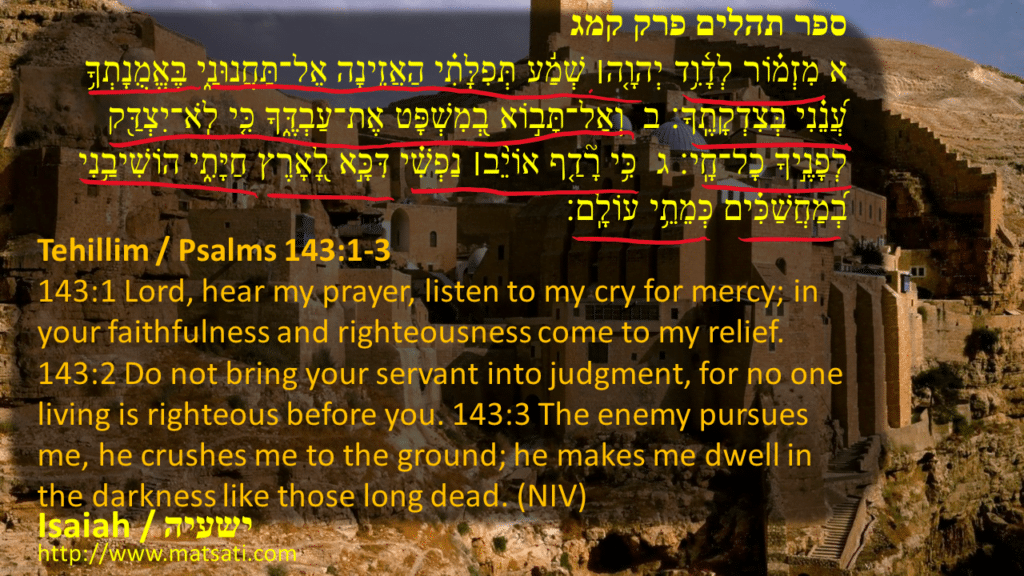
ספר תהלים פרק קמג
א מִזְמ֗וֹר לְדָ֫וִ֥ד יְהוָ֤ה׀ שְׁמַ֬ע תְּפִלָּתִ֗י הַאֲזִ֥ינָה אֶל־תַּחֲנוּנַ֑י בֶּאֱמֻנָתְךָ֥ עֲ֝נֵ֗נִי בְּצִדְקָתֶֽךָ׃ ב וְאַל־תָּב֣וֹא בְ֭מִשְׁפָּט אֶת־עַבְדֶּ֑ךָ כִּ֤י לֹֽא־יִצְדַּ֖ק לְפָנֶ֣יךָ כָל־חָֽי׃ ג כִּ֥י רָ֘דַ֤ף אוֹיֵ֨ב׀ נַפְשִׁ֗י דִּכָּ֣א לָ֭אָרֶץ חַיָּתִ֑י הוֹשִׁיבַ֥נִי בְ֝מַחֲשַׁכִּ֗ים כְּמֵתֵ֥י עוֹלָֽם׃
Tehillim / Psalms 143:1-3
143:1 Lord, hear my prayer, listen to my cry for mercy; in your faithfulness and righteousness come to my relief. 143:2 Do not bring your servant into judgment, for no one living is righteous before you. 143:3 The enemy pursues me, he crushes me to the ground; he makes me dwell in the darkness like those long dead. (NIV)
David writes that the Lord helps those who are in need. The focus should be the need for the Lord, seeking the Lord is our ultimate goal, turning from sin, to walk in God’s ways, these are the things Isaiah is calling the people to. What Isaiah is telling Judah and Jerusalem here is that giving thanks and praise to the Lord is essential in the lives of His people. The source of the praise is to remember the promises of God according to His holy Word. When we repent and believe in His Messiah Yeshua the joy of the Lord becomes real and is properly expressed in giving glory to His Name! The joy of the Lord comes when we realize the enemy has been defeated. The comfort of God comes when sin and iniquity are forgiven. We note how these things begin to remind us of atonement and the sacrificial ritual of the Mishkhan (Tabernacle). We note that deliverance, redemption, salvation, these things are impossible apart for the help of the Lord. Isaiah’s first son Shear-Jashub (Isaiah 7:3) means “a remnant will return,” and was meant to be a reminder to Ahaz to trust in the Lord. The name of his second son Maher-shalal-hash-baz (hurry to butty hurry to prey) was a reminder of destruction and exile. Isaiah goes on saying “Then a shoot will spring from the root of Jesse, and a branch from his roots will bear fruit” (Isaiah 11:1-2). Here is a prophetic message that Judah and Jerusalem were going to be cut down, but like a tree a shoot would sprout, grow, and bear fruit. These things speak of the Messianic expectation, of the one whom God would bring into the world to save His people. This is what Isaiah was trying to get Ahaz to understand, that he was to trust in the Lord and not fear the armies of Syria and Ephraim. Ahaz however refused to trust in the Lord, and instead he put his trust in an alliance with his ultimate enemy, Assyria.
Isaiah 12:2 states, “Behold, God is my salvation; (הִנֵּה אֵל יְשׁוּעָתִי) I will trust, and not be afraid: (אֶבְטַח וְלֹא אֶפְחָד) for the LORD JEHOVAH is my strength and my song; he also is become my salvation. (כִּי עָזִּי וְזִמְרָת יָהּ יְהֹוָה וַיְהִי-לִי לִישׁוּעָה)” Here Isaiah makes it clear that God is our salvation and there is no salvation apart from the Lord God Almighty in heaven. Our deliverance and help is from above, from heaven, from God, and not by the attempts of men to do this on their own by the power of the flesh (Jeremiah 17:5-10). When we believe (have faith) the Lord is able and we walk in that faith it is then the Lord works. It is interesting to note that idolatry is the manipulation of a god to do one’s will. This is the opposite of how God functions in our lives. During Nehemiah and Ezra’s time the Lord demonstrated an act of grace and mercy returning the people back to the Land of Israel in 539 BC. We are told that this act of grace is also demonstrated in His son Yeshua the Messiah. We note this based upon the text from Romans 5:8 and 1 John 4:9-10.
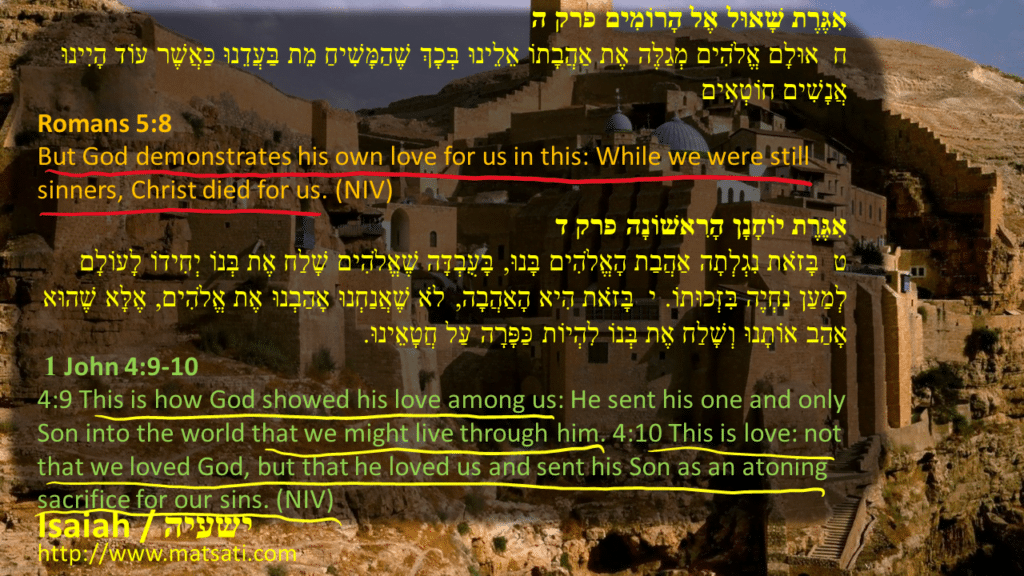
אִגֶּרֶת שָׁאוּל אֶל הָרוֹמִים פרק ה
ח אוּלָם אֱלֹהִים מְגַלֶּה אֶת אַהֲבָתוֹ אֵלֵינוּ בְּכָךְ שֶׁהַמָּשִׁיחַ מֵת בַּעֲדֵנוּ כַּאֲשֶׁר עוֹד הָיִינוּ אֲנָשִׁים חוֹטְאִים
Romans 5:8
But God demonstrates his own love for us in this: While we were still sinners, Christ died for us. (NIV)
אִגֶּרֶת יוֹחָנָן הָרִאשׁוֹנָה פרק ד
ט בָּזֹאת נִגְלְתָה אַהֲבַת הָאֱלֹהִים בָּנוּ, בָּעֻבְדָּה שֶׁאֱלֹהִים שָׁלַח אֶת בְּנוֹ יְחִידוֹ לָעוֹלָם לְמַעַן נִחְיֶה בִּזְכוּתוֹ. י בָּזֹאת הִיא הָאַהֲבָה, לֹא שֶׁאֲנַחְנוּ אָהַבְנוּ אֶת אֱלֹהִים, אֶלָּא שֶׁהוּא אָהַב אוֹתָנוּ וְשָׁלַח אֶת בְּנוֹ לִהְיוֹת כַּפָּרָה עַל חֲטָאֵינוּ.
1 John 4:9-10
4:9 This is how God showed his love among us: He sent his one and only Son into the world that we might live through him. 4:10 This is love: not that we loved God, but that he loved us and sent his Son as an atoning sacrifice for our sins. (NIV)
Here the Lord God provided the sacrifice on our behalf, all we have to do is repent and believe by faith and then walk in that faith. Those who are able to place their trust in the Lord will discover the great peace that God gives in their hearts, and the joy of the Lord who delivers them from all their iniquities.
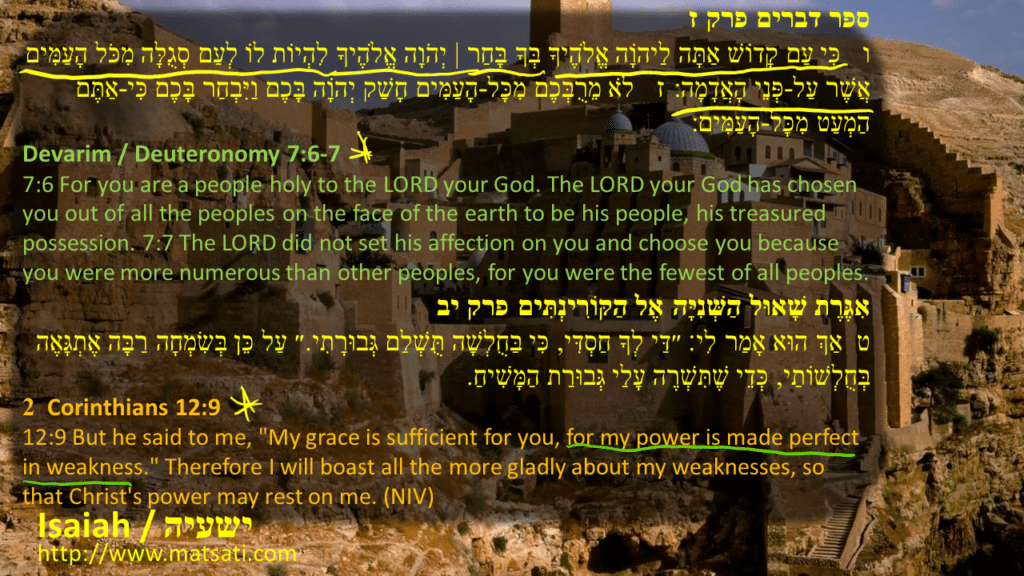
ספר דברים פרק ז
ו כִּי עַם קָדוֹשׁ אַתָּה לַיהוָֹה אֱלֹהֶיךָ בְּךָ בָּחַר | יְהֹוָה אֱלֹהֶיךָ לִהְיוֹת לוֹ לְעַם סְגֻלָּה מִכֹּל הָעַמִּים אֲשֶׁר עַל-פְּנֵי הָאֲדָמָה: ז לֹא מֵרֻבְּכֶם מִכָּל-הָעַמִּים חָשַׁק יְהוָֹה בָּכֶם וַיִּבְחַר בָּכֶם כִּי-אַתֶּם הַמְעַט מִכָּל-הָעַמִּים::
Devarim / Deuteronomy 7:6-7
7:6 For you are a people holy to the LORD your God. The LORD your God has chosen you out of all the peoples on the face of the earth to be his people, his treasured possession. 7:7 The LORD did not set his affection on you and choose you because you were more numerous than other peoples, for you were the fewest of all peoples. (NIV)
אִגֶּרֶת שָׁאוּל הַשְּׁנִיָּה אֶל הַקּוֹרִינְתִּים פרק יב
ט אַךְ הוּא אָמַר לִי׃ ״דַּי לְךָ חַסְדִּי, כִּי בַּחֻלְשָׁה תֻּשְׁלַם גְּבוּרָתִי.״ עַל כֵּן בְּשִׂמְחָה רַבָּה אֶתְגָּאֶה בְּחֻלְשׁוֹתַי, כְּדֵי שֶׁתִּשְׁרֶה עָלַי גְּבוּרַת הַמָּשִׁיחַ.
2 Corinthians 12:9
12:9 But he said to me, “My grace is sufficient for you, for my power is made perfect in weakness.” Therefore I will boast all the more gladly about my weaknesses, so that Christ’s power may rest on me. (NIV)
What we note about these two verses, from the Torah and the NT text, that the Lord God is the One who has chosen us and set us apart for His purposes. The weakness that Paul speaks of is his illness that God would not heal. The conclusion was that in his weakness the Lord God and His Messiah are made powerful in him. The reason is so he remains trusting in the Lord. This is the joy of the Lord, that the ultimate outcome of our faith is depending upon the Lord and His powerful and mighty hand!
Isaiah goes on regarding his chapter of praise connecting us back to Isaiah 2:1-4 of even the nations coming to praise the Lord in His holy mountain. The Lord God and His Messiah enable this drawing all men to truth and life! This idea of trusting in the Lord, a pointed theme throughout all of Scripture, continues in the praises of God’s people. Salvation belongs to the Lord, and because of this Isaiah continues saying the following.
ספר ישעיה פרק יב
ג וּשְׁאַבְתֶּם-מַיִם בְּשָֹשֹוֹן מִמַּעַיְנֵי הַיְשׁוּעָה: ד וַאֲמַרְתֶּם בַּיּוֹם הַהוּא הוֹדוּ לַיהֹוָה קִרְאוּ בִשְׁמוֹ הוֹדִיעוּ בָעַמִּים עֲלִילֹתָיו הַזְכִּירוּ כִּי נִשְֹגָּב שְׁמוֹ: ה זַמְּרוּ יְהֹוָה כִּי גֵאוּת עָשָֹה מיּדַעַת [מוּדַעַת] זֹאת בְּכָל-הָאָרֶץ:
Isaiah12:3 states, “Therefore with joy shall ye draw water out of the wells of salvation. (וּשְׁאַבְתֶּם-מַיִם בְּשָֹשֹוֹן מִמַּעַיְנֵי הַיְשׁוּעָה)” Isaiah 12:4 “And in that day shall ye say, Praise the LORD, (וַאֲמַרְתֶּם בַּיּוֹם הַהוּא הוֹדוּ לַיהֹוָה) call upon his name, (קִרְאוּ בִשְׁמוֹ) declare his doings among the people, make mention that his name is exalted. (הוֹדִיעוּ בָעַמִּים עֲלִילֹתָיו הַזְכִּירוּ כִּי נִשְֹגָּב שְׁמוֹ)” Isaiah 12:5 “Sing unto the LORD; (זַמְּרוּ יְהֹוָה) for he hath done excellent things: (כִּי גֵאוּת עָשָֹה) this is known in all the earth. (מיּדַעַת [מוּדַעַת] זֹאת בְּכָל-הָאָרֶץ)” Isaiah describes the salvation of God as something that may be drawn out of a well, that the Lord God has a place where His salvation is drawn from. This reminds us of Solomon’s words according to Mishley / Proverbs 4:23 and 16:22.
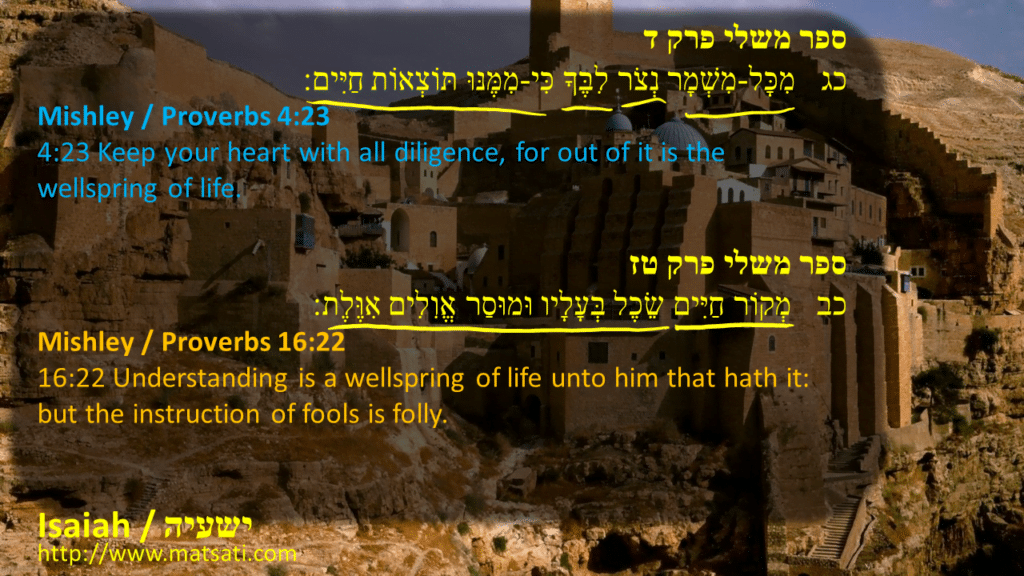
ספר משלי פרק ד
כג מִכָּל-מִשְׁמָר נְצֹר לִבֶּךָ כִּי-מִמֶּנּוּ תּוֹצְאוֹת חַיִּים:
Mishley / Proverbs 4:23
4:23 Keep your heart with all diligence, for out of it is the wellspring of life.
ספר משלי פרק טז
כב מְקוֹר חַיִּים שֵֹכֶל בְּעָלָיו וּמוּסַר אֱוִלִים אִוֶּלֶת:
Mishley / Proverbs 16:22
16:22 Understanding is a wellspring of life unto him that hath it: but the instruction of fools is folly.
To draw from the wellsprings of life is synonymous to that which God gives from within by His presence in our lives. This touches upon the practical application of God’s word to our lives, like Yeshua said according to John 12:50 And I know that his commandment is life eternal: the things therefore which I speak, even as the Father hath said unto me, so I speak. (KJV) There are many Torah parallels to Isaiah 12:3, such as when the Lord provided water for the people in the wilderness (Shemot / Exodus 17:1-7).
In Isaiah 12:4 and 12:5, we find parallels to Tehillim / Psalms 105:1, 145:4-7, and 148:13
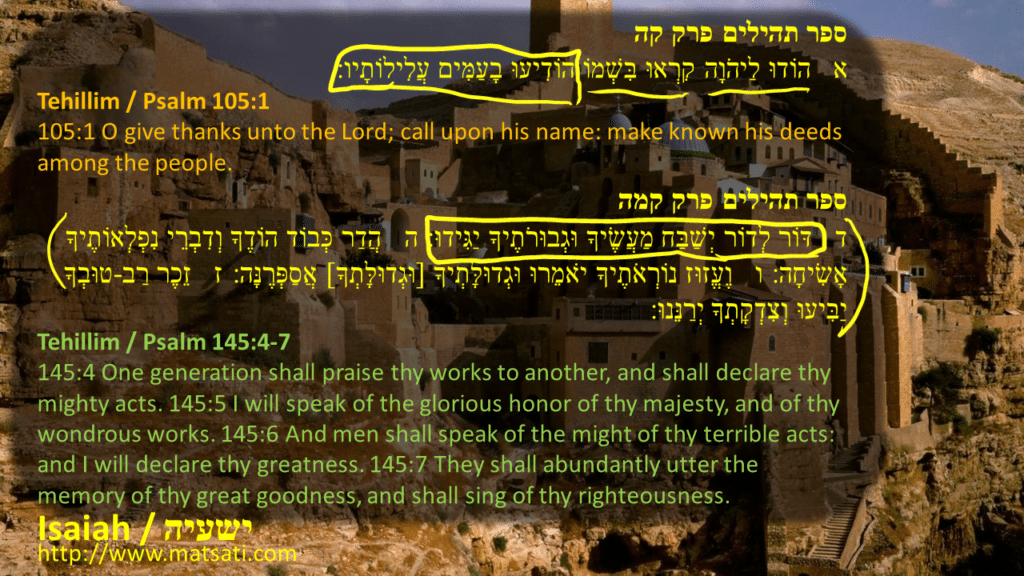
ספר תהילים פרק קה
א הוֹדוּ לַיהֹוָה קִרְאוּ בִּשְׁמוֹ הוֹדִיעוּ בָעַמִּים עֲלִילוֹתָיו:
Tehillim / Psalm 105:1
105:1 O give thanks unto the Lord; call upon his name: make known his deeds among the people.
ספר תהילים פרק קמה
ד דּוֹר לְדוֹר יְשַׁבַּח מַעֲשֶֹיךָ וּגְבוּרֹתֶיךָ יַגִּידוּ: ה הֲדַר כְּבוֹד הוֹדֶךָ וְדִבְרֵי נִפְלְאוֹתֶיךָ אָשִֹיחָה: ו וֶעֱזוּז נוֹרְאֹתֶיךָ יֹאמֵרוּ וּגְדוּלָּתְיךָ [וּגְדוּלָּתְךָ] אֲסַפְּרֶנָּה: ז זֵכֶר רַב-טוּבְךָ יַבִּיעוּ וְצִדְקָתְךָ יְרַנֵּנוּ:
Tehillim / Psalm 145:4-7
145:4 One generation shall praise thy works to another, and shall declare thy mighty acts. 145:5 I will speak of the glorious honor of thy majesty, and of thy wondrous works. 145:6 And men shall speak of the might of thy terrible acts: and I will declare thy greatness. 145:7 They shall abundantly utter the memory of thy great goodness, and shall sing of thy righteousness.
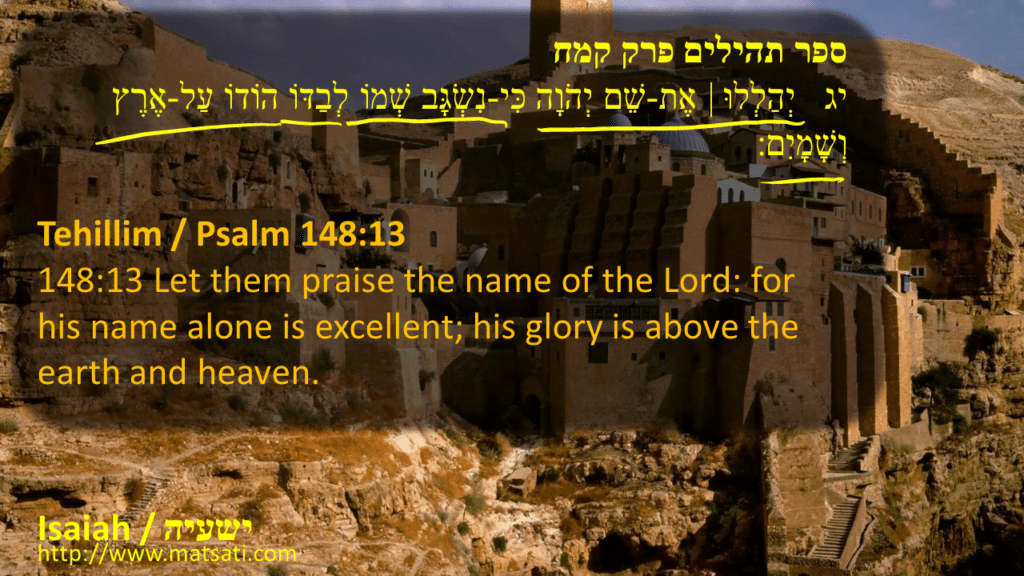
ספר תהילים פרק קמח
יג יְהַלְלוּ | אֶת-שֵׁם יְהֹוָה כִּי-נִשְֹגָּב שְׁמוֹ לְבַדּוֹ הוֹדוֹ עַל-אֶרֶץ וְשָׁמָיִם:
Tehillim / Psalm 148:13
148:13 Let them praise the name of the Lord: for his name alone is excellent; his glory is above the earth and heaven.
The focus here is on praise of the Name of God. These psalms speak to the power of God as creator according to the Torah. The psalmist states הוֹדִיעוּ בָעַמִּים עֲלִילוֹתָיו “make known his deeds among the people” directing the reader to what the Lord has done. The purpose of the Scriptures is so that we can have faith, and we can trust the Lord! This is the psalmist’s conclusions saying, דּוֹר לְדוֹר יְשַׁבַּח מַעֲשֶֹיךָ וּגְבוּרֹתֶיךָ יַגִּידוּ “Generation to generation shall praise your works and shall declare thy mighty acts.” Tehillim / Psalms 145:4-7 speaks of the faithfulness of God to His people in the “wondrous works” and the greatness of his power, goodness, and righteousness. The name of God is connected to His wondrous works. This does not mean that there is an occult way to use His name to wield the power of God. This is a false assumption. Note that in idolatrous worship, men use idols for the purpose of manipulation to their will to do something they want. The Lord God Almighty, the Creator God, the God of Israel, He does not work this way, and His name is not a tool to be pronounced in order to wield the power of God. This is one of the major issues with the Hebrew roots folk who believe one must pronounce the name of God in order to be saved, or worse, so that God can hear your prayer. What the Psalmist and Isaiah are saying is that the Lord God is powerful to deliver his people and He will do so through the remnant of peoples who are willing to trust in the Lord. Isaiah prophecies that the people will return to their faith which will lead to the restoration of the nation again. We note that pride sets itself up in opposition to what the Lord wants in our lives, humbleness and to seek Him. Isaiah goes on saying the following:
ספר ישעיה פרק יב
ו צַהֲלִי וָרֹנִּי יוֹשֶׁבֶת צִיּוֹן כִּי-גָדוֹל בְּקִרְבֵּךְ קְדוֹשׁ יִשְֹרָאֵל:
Isaiah 12:6 states, “Cry out and shout, thou inhabitant of Zion: (צַהֲלִי וָרֹנִּי יוֹשֶׁבֶת צִיּוֹן) for great is the Holy One of Israel in the midst of thee. (כִּי-גָדוֹל בְּקִרְבֵּךְ קְדוֹשׁ יִשְֹרָאֵל)” Isaiah tells the people to cry out and shout out to the Lord, that He is faithful to hear their cry. This is the aspect of our relationship with God that He loves, our seeking Him, for His help to overcome this world, to deliver us, and save us from our sins. We note how all of these things that are taking place here in the book of Isaiah are connected to the pride and sin of the people. The Lord wants to be involved in the details of our lives. Nothing is too small or too great that He can’t be involved. This is why Paul wrote in Colossians 3:23 “And whatever you do, do it heartily, as to the Lord, and not to men.” No matter what we do, we should do it from deep within our hearts as a service to the Lord, as opposed to going through the motions outwardly and not considering the significance of our actions. The Scriptures say that the Lord examines the innermost heart and so He is interested in every aspect of our lives, even our thought life. The Lord is faithful and holy, and desires to reveal Himself to us. This is why we have been given the Scriptures, so that we can know that the Lord God desires to dwell among us, to be our God and we can be His people. (Shemot / Exodus 40:34-35, Isaiah 57:15, 66:1-2, John 1:14 and 14:15-17) It is because of these things and who God is that we rejoice and are glad to give Him praise in all that He has done for us!
Rabbinic Commentary on Isaiah 12:1-6
The Targum Johnathan is a rabbinic interpretation of the book of Isaiah, a very important resource for our consideration.
תרגום יונתן בן עוזיאל אל ישעיה פרק יב:א-ו
א וְתֵימְרוּן בְעִידָנָא הַהוּא אֹודֵי קֳדָמָך יוי אְרֵי עַל דְחַבִית קֳדָמָך הְוָה רוּגזָך עְלַי כַדוּ יְתוּב רוּגזָך מִנִי וּתרַחֵים עְלָי׃ ב הָא עַל מֵימַר אְלָה פוּרקָנִי אְנָא רְחִיץ וְלָא אַזדַעזַע אְרֵי תוּקפִי וְתוּשבַחתִי דְחִילָא יוי אְמַר בְמֵימְרֵיה וַהְוָה לִי לְפָרִיק׃ ג וּתקַבְלוּן אֻלפָן חְדַת בְחַדוָא מִבְחִירֵי צִדקָא׃ ד וְתֵימְרוּן בְעִידָנָא הַהוּא אֹודֹו קֳדָם יוי צַלֹו בִשמֵיה חַוֹו בְעַמְמַיָא עֹובָדֹוהִי אַדכַרוּ אְרֵי תַקִיף שְמֵיה׃ ה שַבַחוּ קֳדָם יוי אְרֵי גְבוּרָן עָבֵיד גַליָא דָא בְכָל אַרעָא׃ ו בוּעִי וְשַבַחִי כְנִשתָא דְצִיֹון אְרֵי רַבָא אְמַר לְאַשרָאָה שְכִינְתֵיה בְגַויִך קַדִישָא דְיִשׂרָאֵל׃
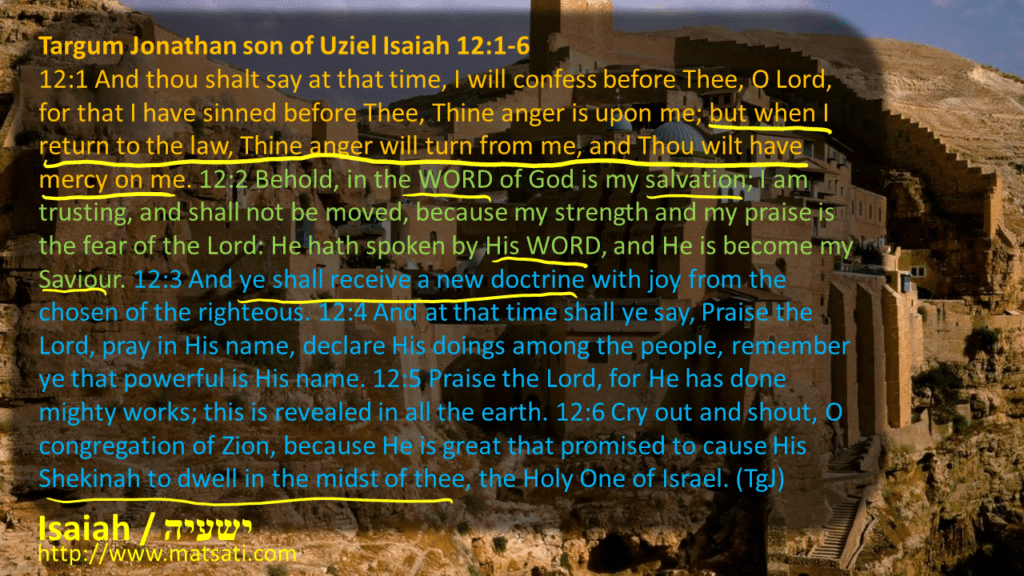
Targum Jonathan son of Uziel Isaiah 12:1-6
12:1 And thou shalt say at that time, I will confess before Thee, O Lord, for that I have sinned before Thee, Thine anger is upon me; but when I return to the law, Thine anger will turn from me, and Thou wilt have mercy on me. 12:2 Behold, in the WORD of God is my salvation; I am trusting, and shall not be moved, because my strength and my praise is the fear of the Lord: He hath spoken by His WORD, and He is become my Saviour. 12:3 And ye shall receive a new doctrine with joy from the chosen of the righteous. 12:4 And at that time shall ye say, Praise the Lord, pray in His name, declare His doings among the people, remember ye that powerful is His name. 12:5 Praise the Lord, for He has done mighty works; this is revealed in all the earth. 12:6 Cry out and shout, O congregation of Zion, because He is great that promised to cause His Shekinah to dwell in the midst of thee, the Holy One of Israel. (TgJ)
In the Targum Jonathan, the translation speaks to the importance of returning to God’s Word and walking in His holy ways. The rabbinic interpretation (Rashi) says that the exile was meant for atonement making amends for iniquity. This is a very important concept. TgJ says א וְתֵימְרוּן בְעִידָנָא הַהוּא אֹודֵי קֳדָמָך יוי אְרֵי עַל דְחַבִית קֳדָמָך הְוָה רוּגזָך עְלַי כַדוּ יְתוּב רוּגזָך מִנִי וּתרַחֵים עְלָי׃ 12:1 And thou shalt say at that time, I will confess before Thee, O Lord, for that I have sinned before Thee, Thine anger is upon me; but when I return to the law, Thine anger will turn from me, and Thou wilt have mercy on me. (TgJ) The Targum rendering of Isaiah 12:1 is significant, as confession before the Lord and returning to Torah are fundamental concepts according to the NT text. Let’s look at John 5:45-47 as an example of this concept.
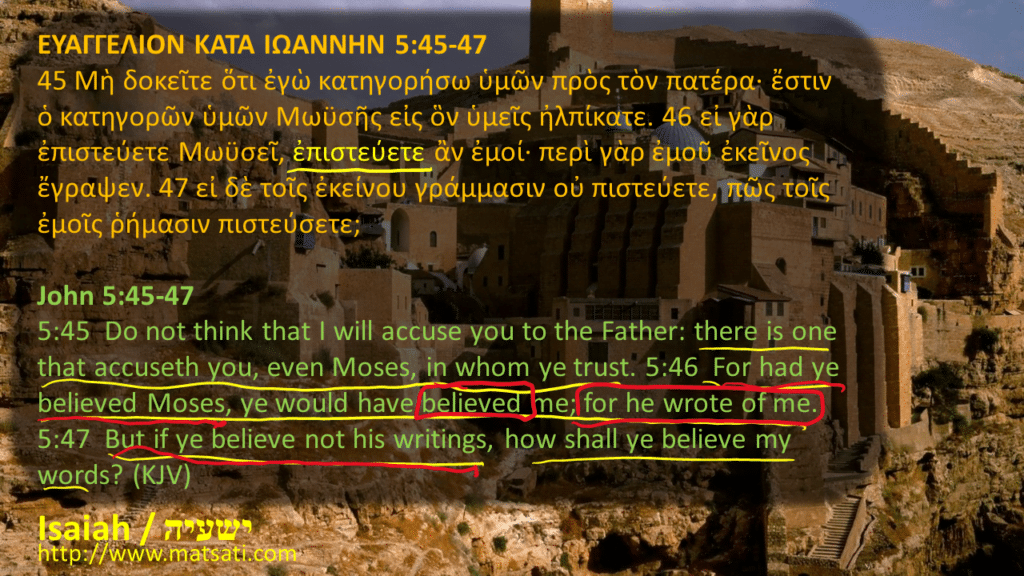
ΕΥΑΓΓΕΛΙΟΝ ΚΑΤΑ ΙΩΑΝΝΗΝ 5:45-47
45 Μὴ δοκεῖτε ὅτι ἐγὼ κατηγορήσω ὑμῶν πρὸς τὸν πατέρα· ἔστιν ὁ κατηγορῶν ὑμῶν Μωϋσῆς εἰς ὃν ὑμεῖς ἠλπίκατε. 46 εἰ γὰρ ἐπιστεύετε Μωϋσεῖ, ἐπιστεύετε ἂν ἐμοί· περὶ γὰρ ἐμοῦ ἐκεῖνος ἔγραψεν. 47 εἰ δὲ τοῖς ἐκείνου γράμμασιν οὐ πιστεύετε, πῶς τοῖς ἐμοῖς ῥήμασιν πιστεύσετε;
John 5:45-47
5:45 Do not think that I will accuse you to the Father: there is one that accuseth you, even Moses, in whom ye trust. 5:46 For had ye believed Moses, ye would have believed me; for he wrote of me. 5:47 But if ye believe not his writings, how shall ye believe my words? (KJV)
Notice the confluence of believing (ἐπιστεύετε, “had you believed”) here in John 5:45-47. The first object of the verb is Moshe and Yeshua, respectively. And in the next verse, the object is what Moses wrote and Messiah’s words respectively. John constructed the text this way deliberately. To believe (ἐπιστεύετε) takes on the sense of loyalty or believing depending on its object. We remember that to believe is to be faithful, the proof of believing is to be faithful meaning that one is obeying God’s Word. Remember the various references from the Tanakh that speak to Israel giving lip service to the Lord, but their hearts were far from Him (God). The reason this is a problem is because believing without faithfulness doesn’t work. We note that because of this in the English translations, “to be faithful” is often translated as “believe.” This word ἐπιστεύετε means “had you believed” in Moshe, referring to the Torah, you would have believed in the Messiah Yeshua, the son of God. Remember, the proof of faith (believing) is to Love God and to keep His commandments (John 14:15). To have faith, to believe, this is a truth claim, to believe in the prophets means to be faithful to their teachings. Just as Isaiah is saying here to return to the Lord in faith, to believe his words that are coming through the lips of his servant / prophet. We note the significance of the TgJ translation pointing out these nuances of faith and faithfulness, this is significant because the NT text also speaks to this truth, as confession before the Lord and returning to Torah are fundamental and foundational to our faith. The Talmud Bavli Niddah 31a states the following concerning this verse.
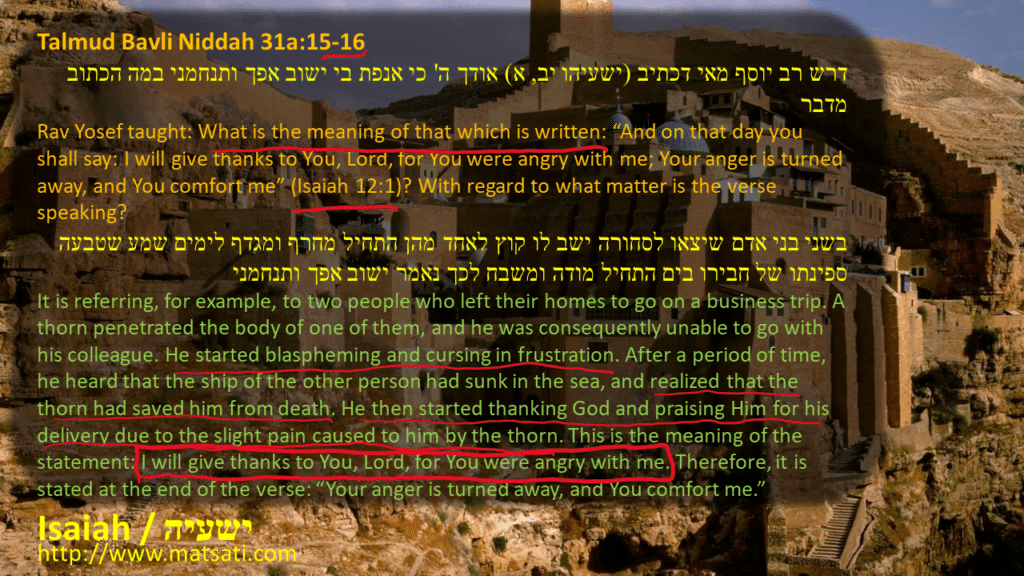
Talmud Bavli Niddah 31a:15-16
דרש רב יוסף מאי דכתיב (ישעיהו יב, א) אודך ה’ כי אנפת בי ישוב אפך ותנחמני במה הכתוב מדבר
Rav Yosef taught: What is the meaning of that which is written: “And on that day you shall say: I will give thanks to You, Lord, for You were angry with me; Your anger is turned away, and You comfort me” (Isaiah 12:1)? With regard to what matter is the verse speaking?
בשני בני אדם שיצאו לסחורה ישב לו קוץ לאחד מהן התחיל מחרף ומגדף לימים שמע שטבעה ספינתו של חבירו בים התחיל מודה ומשבח לכך נאמר ישוב אפך ותנחמני
It is referring, for example, to two people who left their homes to go on a business trip. A thorn penetrated the body of one of them, and he was consequently unable to go with his colleague. He started blaspheming and cursing in frustration. After a period of time, he heard that the ship of the other person had sunk in the sea, and realized that the thorn had saved him from death. He then started thanking God and praising Him for his delivery due to the slight pain caused to him by the thorn. This is the meaning of the statement: I will give thanks to You, Lord, for You were angry with me. Therefore, it is stated at the end of the verse: “Your anger is turned away, and You comfort me.”
The rabbis ask what is the meaning of Isaiah 12:1 and then provide a story of a sequence of events to illustrate the meaning. When bad things happen to us, these may be meant for our good. In the rabbinic illustration, the thorn led to saving a person’s life. The thorn at first caused the man to swear and curse, but when his life was saved, he was thankful and praised God for delivering him due to the pain. This is where the concept of atonement through suffering is illustrated, that a little suffering leads to God’s anger turning away and His comfort coming. The author of the book Derekh HaShem (“the way of God”) interprets this in the following way:
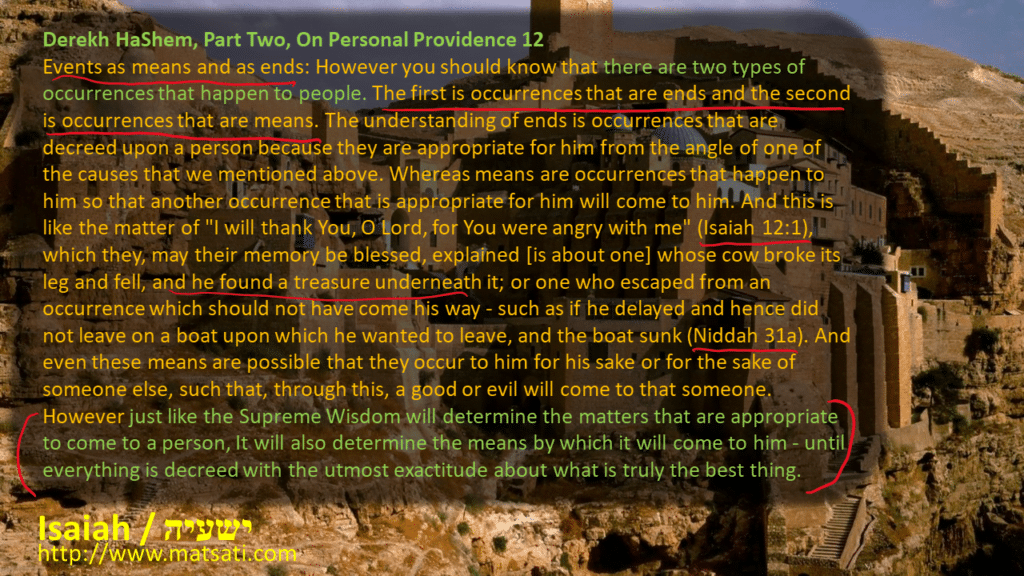
Derekh HaShem, Part Two, On Personal Providence 12
Events as means and as ends: However you should know that there are two types of occurrences that happen to people. The first is occurrences that are ends and the second is occurrences that are means. The understanding of ends is occurrences that are decreed upon a person because they are appropriate for him from the angle of one of the causes that we mentioned above. Whereas means are occurrences that happen to him so that another occurrence that is appropriate for him will come to him. And this is like the matter of “I will thank You, O Lord, for You were angry with me” (Isaiah 12:1), which they, may their memory be blessed, explained [is about one] whose cow broke its leg and fell, and he found a treasure underneath it; or one who escaped from an occurrence which should not have come his way – such as if he delayed and hence did not leave on a boat upon which he wanted to leave, and the boat sunk (Niddah 31a). And even these means are possible that they occur to him for his sake or for the sake of someone else, such that, through this, a good or evil will come to that someone. However just like the Supreme Wisdom will determine the matters that are appropriate to come to a person, It will also determine the means by which it will come to him – until everything is decreed with the utmost exactitude about what is truly the best thing.
Again the examples provided suggest that we should take a step back and examine the underlying purpose of why certain events happen to us in our lives. The events in our lives may be a divine gift to cause us to repent, or show us a truth, or change our character. We note how these things are consistent with Paul’s interpretation according to Romans 8:29. Paul states that God is molding us to conform to the likeness of his Son, which means we are being shaped to think and live like the Messiah (1 Corinthians 2:16). The Torah tells us that we are created in the image of God and as our mind is renewing to the mind of Mashiakh, we are becoming the person God created us to be. The next commentary Orchot Tzadikim 9:73 states the following concerning this verse (Isaiah 12:1).
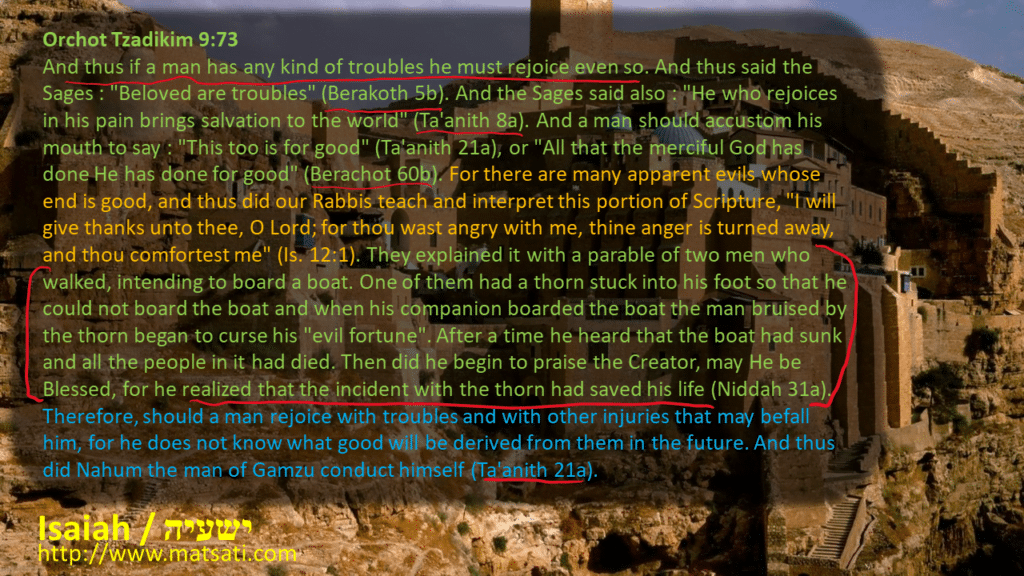
Orchot Tzadikim 9:73
And thus if a man has any kind of troubles he must rejoice even so. And thus said the Sages : “Beloved are troubles” (Berakoth 5b). And the Sages said also : “He who rejoices in his pain brings salvation to the world” (Ta’anith 8a). And a man should accustom his mouth to say : “This too is for good” (Ta’anith 21a), or “All that the merciful God has done He has done for good” (Berachot 60b). For there are many apparent evils whose end is good, and thus did our Rabbis teach and interpret this portion of Scripture, “I will give thanks unto thee, O Lord; for thou wast angry with me, thine anger is turned away, and thou comfortest me” (Is. 12:1). They explained it with a parable of two men who walked, intending to board a boat. One of them had a thorn stuck into his foot so that he could not board the boat and when his companion boarded the boat the man bruised by the thorn began to curse his “evil fortune”. After a time he heard that the boat had sunk and all the people in it had died. Then did he begin to praise the Creator, may He be Blessed, for he realized that the incident with the thorn had saved his life (Niddah 31a). Therefore, should a man rejoice with troubles and with other injuries that may befall him, for he does not know what good will be derived from them in the future. And thus did Nahum the man of Gamzu conduct himself (Ta’anith 21a).
The rabbinic interpretation is that “there are many apparent evils whose end is good” meaning that there is a heavenly perspective that we must consider. Here it is interesting how the commentary summarizes the Talmudic commentary on this topic saying that the sages believe troubles in this life should be rejoiced over and God should be glorified. Their conclusion, “He who rejoices in his pain brings salvation to the world” (Ta’anith 8a) note the parallel to what Yeshua has done on our behalf! He suffered upon the cross (tree) bearing the curse of God and doing so on our behalf bringing salvation to the world, for those who would believe. Again, there is mention of the things that happen to us may be apparent evils whose end is good. This is why Derek HaShem describes “the means and the ends” concerning the events of our lives. The anger and the turning from anger describe the mercies of God towards His people, His grace to forgive. The commentary ends on Nahum of Gamzu, who lived at the end of the Second Temple period. He was a righteous man who led a very difficult life. He was blind in both eyes, both his hands were cut off, his feet amputated, and his entire body was covered with boils. The narrative goes saying that one day, his students inquired what he had done to justify the suffering he endures on a day-to-day basis. Nahum told them his tale of woe:
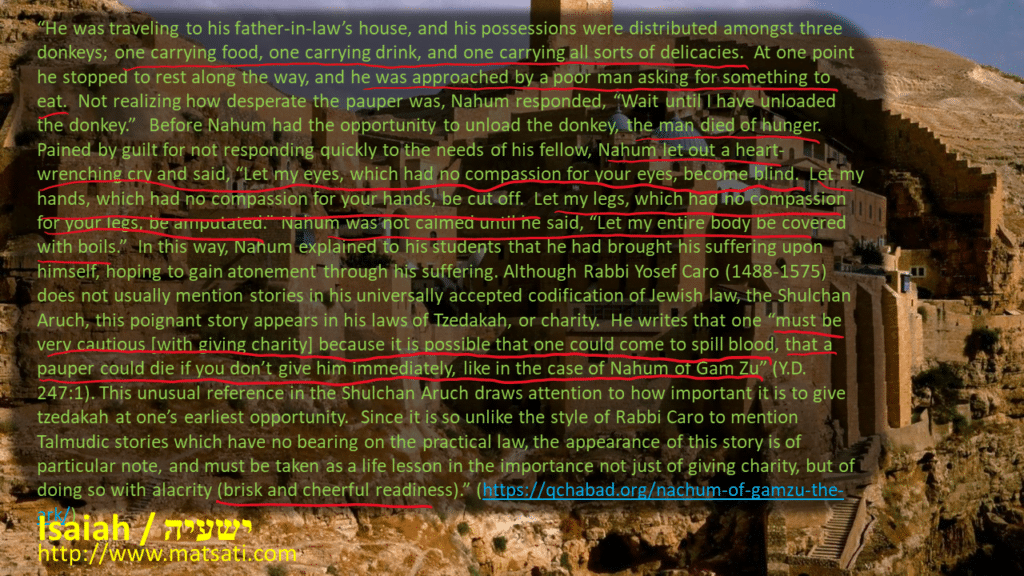
“He was traveling to his father-in-law’s house, and his possessions were distributed amongst three donkeys; one carrying food, one carrying drink, and one carrying all sorts of delicacies. At one point he stopped to rest along the way, and he was approached by a poor man asking for something to eat. Not realizing how desperate the pauper was, Nahum responded, “Wait until I have unloaded the donkey.” Before Nahum had the opportunity to unload the donkey, the man died of hunger. Pained by guilt for not responding quickly to the needs of his fellow, Nahum let out a heart-wrenching cry and said, “Let my eyes, which had no compassion for your eyes, become blind. Let my hands, which had no compassion for your hands, be cut off. Let my legs, which had no compassion for your legs, be amputated.” Nahum was not calmed until he said, “Let my entire body be covered with boils.” In this way, Nahum explained to his students that he had brought his suffering upon himself, hoping to gain atonement through his suffering. Although Rabbi Yosef Caro (1488-1575) does not usually mention stories in his universally accepted codification of Jewish law, the Shulchan Aruch, this poignant story appears in his laws of Tzedakah, or charity. He writes that one “must be very cautious [with giving charity] because it is possible that one could come to spill blood, that a pauper could die if you don’t give him immediately, like in the case of Nahum of Gam Zu” (Y.D. 247:1). This unusual reference in the Shulchan Aruch draws attention to how important it is to give tzedakah at one’s earliest opportunity. Since it is so unlike the style of Rabbi Caro to mention Talmudic stories which have no bearing on the practical law, the appearance of this story is of particular note, and must be taken as a life lesson in the importance not just of giving charity, but of doing so with alacrity (brisk and cheerful readiness).” (https://qchabad.org/nachum-of-gamzu-the-ark/)
The point drives forward this concept of the righteous being willing to have compassion, and if being unwilling one should be willing to suffer. The instruments that God has given us (our lives, our bodies, our possessions) are to be used for the glory of God to help others. Note how Nahum of Gamzu, a righteous man, was willing to suffer on behalf of others. These concepts all enter into the equation of what we are reading according to the NT account of Yeshua the Messiah laying his life down on our behalf. The Lord God is worthy to be praised, regardless of the situation that comes our way, whether good or bad. These things teach us that God’s salvation may come through suffering, and even Yeshua told us to expect suffering by reason of His name. (Matthew 24:9) The TgJ goes on translating Isaiah 12:2 saying, ב הָא עַל מֵימַר אְלָה פוּרקָנִי אְנָא רְחִיץ וְלָא אַזדַעזַע אְרֵי תוּקפִי וְתוּשבַחתִי דְחִילָא יוי אְמַר בְמֵימְרֵיה וַהְוָה לִי לְפָרִיק׃ 12:2 Behold, in the WORD of God is my salvation; I am trusting, and shall not be moved, because my strength and my praise is the fear of the Lord: He hath spoken by His WORD, and He is become my Savior. (TgJ) Isaiah speaks of trusting in the Lord, this is a common theme throughout all of Scripture, to trust in the Lord. The TgJ translation states that our trust is in the Lord, He is our strength, and because of this we will not be moved. As the apostle Paul begins to close his letter to the Ephesians, he makes this final appeal saying, “Finally, be strong in the Lord and in his mighty power” (Ephesians 6:10, Τοῦ λοιποῦ, ἐνδυναμοῦσθε ἐν κυρίῳ καὶ ἐν τῷ κράτει τῆς ἰσχύος αὐτοῦ). The word ἐνδυναμοῦσθε is translated “be strong” here actually means “to be strengthened.” Paul writes that we are to be strengthened in the Lord and in the strength of His power in our lives. This is the trust that we are to have, to believe, to take hold of His Word (God’s truth), to apply it to our lives, to stand strong bearing the testimony of God and give glory to His name regardless of the circumstance. Like Job said, God giveth and God taketh away, (Job 1:21) and his conclusion was “may the name of the Lord be praised!” Consider how all of these things are consistent throughout the biblical narratives, and in the NT text and even in the rabbinic literature (Jewish thought). Rashi states the following concerning these verses.
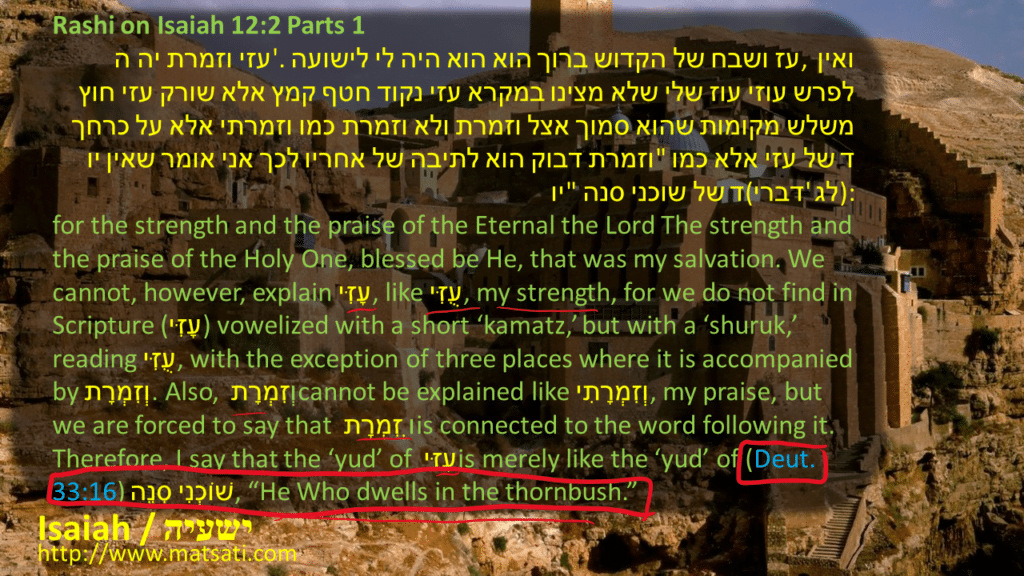
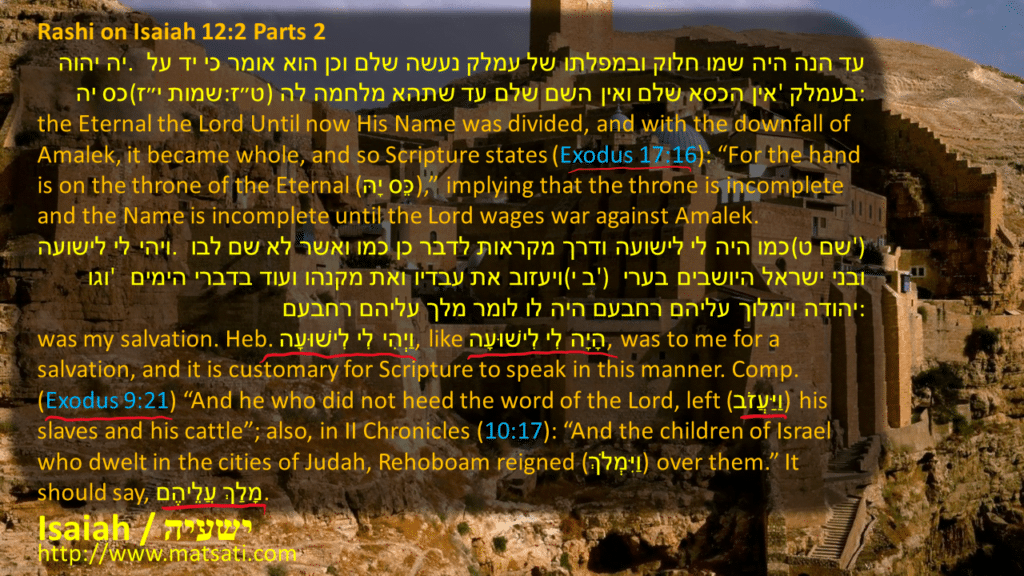
Rashi on Isaiah 12:2 Parts 1-2
עזי וזמרת יה ה’. עז ושבח של הקדוש ברוך הוא הוא היה לי לישועה, ואין לפרש עוזי עוז שלי שלא מצינו במקרא עזי נקוד חטף קמץ אלא שורק עזי חוץ משלש מקומות שהוא סמוך אצל וזמרת ולא וזמרת כמו וזמרתי אלא על כרחך וזמרת דבוק הוא לתיבה של אחריו לכך אני אומר שאין יו”ד של עזי אלא כמו יו”ד של שוכני סנה (דברי’ לג):
for the strength and the praise of the Eternal the Lord The strength and the praise of the Holy One, blessed be He, that was my salvation. We cannot, however, explain עָזִּי, like עֻזִּי, my strength, for we do not find in Scripture עָזִּי vowelized with a short ‘kamatz,’ but with a ‘shuruk,’ reading עֻזִּי, with the exception of three places where it is accompanied by וְזִמְרָת. Also, וְזִמְרָת cannot be explained like וְזִמְרָתִי, my praise, but we are forced to say that וְזִמְרָת is connected to the word following it. Therefore, I say that the ‘yud’ of עָזִּי is merely like the ‘yud’ of (Deut. 33:16) שׁוֹכְנִי סְנֶה, “He Who dwells in the thornbush.”
יה יהוה. עד הנה היה שמו חלוק ובמפלתו של עמלק נעשה שלם וכן הוא אומר כי יד על כס יה (שמות י״ז:ט״ז) אין הכסא שלם ואין השם שלם עד שתהא מלחמה לה’ בעמלק:
the Eternal the Lord Until now His Name was divided, and with the downfall of Amalek, it became whole, and so Scripture states (Exodus 17:16): “For the hand is on the throne of the Eternal (כֵּס יָהּ),” implying that the throne is incomplete and the Name is incomplete until the Lord wages war against Amalek.
ויהי לי לישועה. כמו היה לי לישועה ודרך מקראות לדבר כן כמו ואשר לא שם לבו (שם ט’) וגו’ ויעזוב את עבדיו ואת מקנהו ועוד בדברי הימים (ב י’) ובני ישראל היושבים בערי יהודה וימלוך עליהם רחבעם היה לו לומר מלך עליהם רחבעם:
was my salvation. Heb. וַיְהִי לִי לִישׁוּעָה, like הָיָה לִי לִישׁוּעָה, was to me for a salvation, and it is customary for Scripture to speak in this manner. Comp. (Exodus 9:21) “And he who did not heed the word of the Lord, left (וַיַּעֲזֹב) his slaves and his cattle”; also, in II Chronicles (10:17): “And the children of Israel who dwelt in the cities of Judah, Rehoboam reigned (וַיִּמְלֹךְ) over them.” It should say, מָלַךְ עֲלֵיהֶם.
Rashi’s discussion is attempting to connect suffering (Deut. 33:16) שׁוֹכְנִי סְנֶה, “He Who dwells in the thornbush” with the praises of the Eternal God, the Almighty One, and salvation. Notice that this is exactly what the Lord told Paul according to 2 Corinthians 12:9 “And he said unto me, My grace is sufficient for thee: for my strength is made perfect in weakness. Most gladly therefore will I rather glory in my infirmities, that the power of Christ may rest upon me.” (KJV) This is a striking parallel to what the Rabbis are saying concerning suffering and the power of God and atonement. Rashi comments that the throne of God and the Name of God are incomplete until He wages war against our enemies. These are Torah centric principles of the Lord God promising to go before His people to war against our enemies. This also means that the Lord will provide for our needs according to His character. He defends His people and makes provision where there is oppression. All of these things are coupled to heeding (listening and obeying) the Word of God. These things are again consistent with the Scriptures, the blessing comes when we listen and obey, the curse comes when we turn from God’s holy Word turning from truth and trust in man as opposed to God. The mercy and grace of God are found in His being faithful to His promises and causing us to repent, to turn from our sins to live for Him. Note how consistent these things are with the Torah and all of Scripture.
The TgJ continues saying, ג וּתקַבְלוּן אֻלפָן חְדַת בְחַדוָא מִבְחִירֵי צִדקָא׃ 12:3 And ye shall receive a new doctrine with joy from the chosen of the righteous. ד וְתֵימְרוּן בְעִידָנָא הַהוּא אֹודֹו קֳדָם יוי צַלֹו בִשמֵיה חַוֹו בְעַמְמַיָא עֹובָדֹוהִי אַדכַרוּ אְרֵי תַקִיף שְמֵיה׃ 12:4 And at that time shall ye say, Praise the Lord, pray in His name, declare His doings among the people, remember ye that powerful is His name. ה שַבַחוּ קֳדָם יוי אְרֵי גְבוּרָן עָבֵיד גַליָא דָא בְכָל אַרעָא׃ 12:5 Praise the Lord, for He has done mighty works; this is revealed in all the earth. ו בוּעִי וְשַבַחִי כְנִשתָא דְצִיֹון אְרֵי רַבָא אְמַר לְאַשרָאָה שְכִינְתֵיה בְגַויִך קַדִישָא דְיִשׂרָאֵל׃ 12:6 Cry out and shout, O congregation of Zion, because He is great that promised to cause His Shekinah to dwell in the midst of thee, the Holy One of Israel. (TgJ) According to the TgJ the praise of God surrounds a new doctrine, the wonderful works of the Lord, and the Torah centric principle of the Lord God dwelling in our midst. The presence of the Shechinah in the midst of the people is found in Shemot / Exodus 25:8 “Let them make me a sanctuary (מִקְדָּשׁ) so that I may dwell in their midst.” So, the idea here is about making space for the Lord God to work in our lives. This is about giving the Lord God Almighty and His Messiah a place in our lives. This takes some effort on our part, to make time to draw near, to study God’s word, to pray. We note that within each of us is an inner void, a place where only God belongs. Without the Lord one has the tendency to fill that void with other things, which consist of the works of the flesh. Note that it is easy to simply agree with what the scripture says concerning these things, and then go and fill one’s life with the works of the flesh to become unconcerned for what God wants in our lives which is to walk according to the spirit. Having an emotional and mental connection to the truth of God is not the same as putting these truths into action! This is what it means when the Scriptures say that trusting God is more than just a lip service. It is more than just a belief. Trusting God means surrendering our lives to Him and letting Him guide our lives into His truth for His glory according to His Word!
